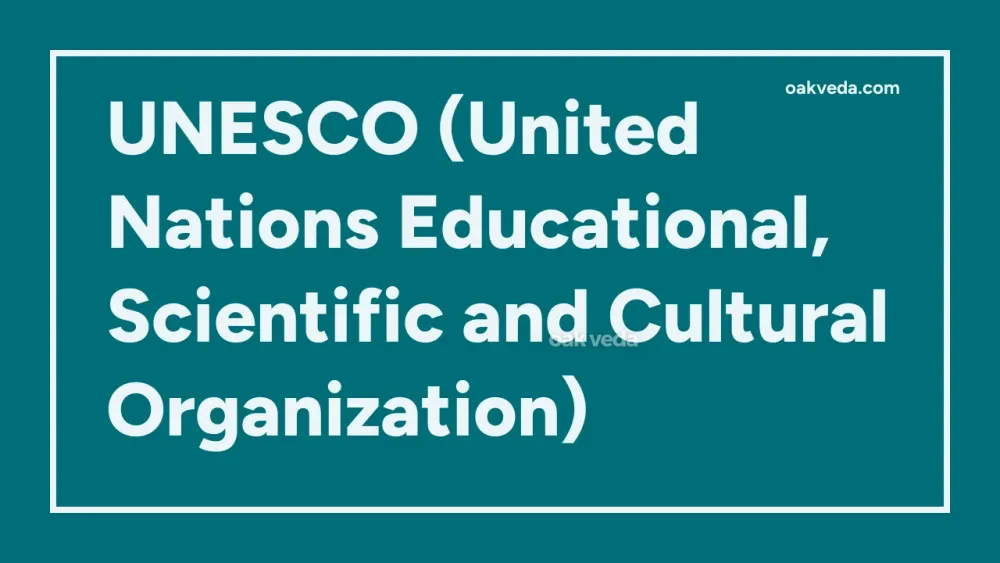
What is the Full Form of UNESCO?
UNESCO's full form is the United Nations Educational, Scientific and Cultural Organization. This specialized agency of the United Nations plays a crucial role in promoting international collaboration in the fields of education, science, culture, and communication.
What is United Nations Educational, Scientific and Cultural Organization?
The United Nations Educational, Scientific and Cultural Organization, commonly known as UNESCO, is a renowned international organization dedicated to fostering peace, sustainable development, and intercultural dialogue through education, science, culture, and communication. Established in 1945, UNESCO works tirelessly to create a more inclusive, knowledge-based society on a global scale.
Origin and Development of UNESCO
UNESCO was founded on November 16, 1945, in the aftermath of World War II. The organization emerged from the collective desire of nations to prevent future conflicts through international cooperation and mutual understanding. Since its inception, UNESCO has grown to include 193 member states and 11 associate members, making it one of the most influential UN agencies worldwide.
How does UNESCO work?
UNESCO operates through five main program areas:
- Education
- Natural Sciences
- Social and Human Sciences
- Culture
- Communication and Information
The organization collaborates with governments, NGOs, and local communities to implement projects and initiatives that align with its mission. UNESCO's work is guided by its General Conference, which meets every two years to set policies and approve programs.
Functions of UNESCO
UNESCO's primary functions include:
- Promoting quality education for all
- Fostering scientific research and innovation
- Preserving cultural heritage and diversity
- Encouraging freedom of expression and access to information
- Supporting sustainable development and peace-building initiatives
Applications of UNESCO's Work
UNESCO's efforts have far-reaching applications across various sectors:
Education
- Developing educational policies and curricula
- Promoting literacy and lifelong learning
- Supporting teacher training programs
Science
- Advancing research in natural and social sciences
- Addressing global challenges like climate change and water scarcity
- Promoting ethical scientific practices
Culture
- Safeguarding tangible and intangible cultural heritage
- Promoting cultural diversity and intercultural dialogue
- Supporting creative industries and artistic expression
Communication
- Advocating for freedom of expression and press freedom
- Promoting universal access to information
- Preserving documentary heritage through the Memory of the World Program
Features of UNESCO
Key features that distinguish UNESCO include:
- Global reach and influence
- Interdisciplinary approach to addressing complex issues
- Emphasis on international cooperation and knowledge-sharing
- Recognition of outstanding achievements through UNESCO prizes and awards
- Designation of World Heritage Sites and Biosphere Reserves
Benefits of UNESCO
UNESCO's work brings numerous benefits to the global community:
- Improved access to quality education worldwide
- Preservation of cultural and natural heritage for future generations
- Enhanced scientific cooperation and knowledge exchange
- Promotion of cultural diversity and intercultural understanding
- Support for sustainable development and peace-building efforts
Limitations or Challenges of UNESCO
Despite its significant contributions, UNESCO faces several challenges:
- Limited financial resources compared to the scope of its mission
- Political tensions among member states affecting decision-making
- Balancing diverse cultural perspectives and interests
- Adapting to rapidly changing technological and social landscapes
- Measuring the long-term impact of its programs and initiatives
Future Developments in UNESCO's Work
As UNESCO continues to evolve, several key areas of focus are emerging:
- Leveraging digital technologies to enhance education and cultural preservation
- Addressing the challenges posed by artificial intelligence and big data
- Promoting open science and open access to scientific information
- Developing strategies to combat disinformation and promote media literacy
- Strengthening efforts to achieve the UN Sustainable Development Goals
FAQs on UNESCO Full Form
-
When was UNESCO established? UNESCO was founded on November 16, 1945.
-
Where is UNESCO's headquarters located? UNESCO's headquarters is in Paris, France.
-
How many member states does UNESCO have? As of 2023, UNESCO has 193 member states and 11 associate members.
-
What is UNESCO's World Heritage List? The World Heritage List is a collection of cultural and natural sites deemed to have outstanding universal value, as designated by UNESCO.
-
How does UNESCO contribute to education? UNESCO promotes quality education for all through policy development, teacher training, curriculum design, and literacy programs.
-
What is UNESCO's role in scientific research? UNESCO supports scientific research by fostering international cooperation, promoting ethical practices, and addressing global challenges through its scientific programs.
-
How does UNESCO protect cultural heritage? UNESCO protects cultural heritage through its World Heritage Sites program, the Intangible Cultural Heritage List, and various preservation initiatives.
-
What is UNESCO's stance on freedom of expression? UNESCO strongly advocates for freedom of expression and press freedom as fundamental human rights essential for democracy and development.
-
How can individuals get involved with UNESCO's work? Individuals can participate in UNESCO's work through volunteering, internships, or supporting UNESCO-affiliated organizations and clubs in their local communities.
-
What is the significance of UNESCO's Creative Cities Network? The Creative Cities Network promotes cooperation among cities that have identified creativity as a strategic factor for sustainable urban development.
You may be interested in:

